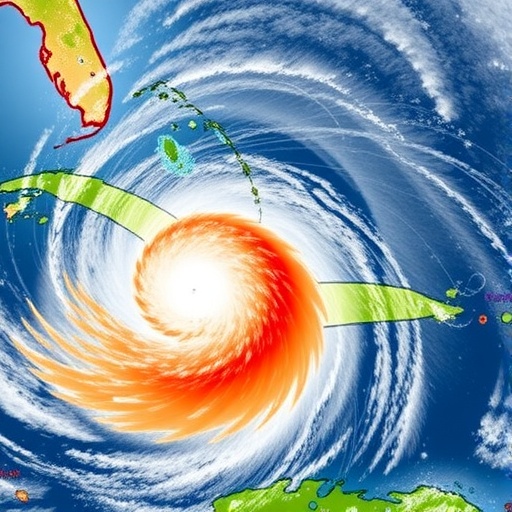In recent years, the intricate ecosystems of Caribbean sponge communities have come under increased scrutiny, particularly in the wake of two devastating category-5 hurricanes that struck the region. The research conducted by Gochfeld, Brandt, and Smith, among others, brings to light the complex dynamics governing the recovery of these vital marine organisms. The study reveals that recovery does not occur uniformly across different sites, pointing to a profound variability that underscores the adaptability and resilience of sponge communities in the face of extreme environmental shifts.
One of the most poignant findings of this research is the stark reminder of how climate change intensifies the impact of natural disasters. With hurricanes becoming more frequent and severe due to rising ocean temperatures and altered climatic conditions, the survival and recovery of marine species hinged on a variety of environmental factors. As scientists delve deeper into the repercussions of these storms, it becomes evident that the resilience of sponge communities is not merely a biological phenomenon but a complex interaction with their surrounding environments.
The study meticulously documents the multi-year recovery trajectory of sponge populations across different sites following the hurricanes. This research approach introduces an important shift in understanding how environmental variabilities influence sponge resilience. Some sites exhibited a remarkable rebound, with sponge densities and diversity returning to pre-hurricane levels within a few years, while others struggled significantly, sometimes exhibiting permanent shifts in community structure. Such differences can provide critical insights into how we manage and conserve these ecosystems moving forward.
By using comprehensive field surveys and employing advanced ecological metrics, the researchers brought together a wealth of data encompassing sponge composition and density. Their methodology highlights a proactive approach to assessing biological communities over time, providing a framework that can support further research into resilient marine ecosystems. Through meticulous analyses, the researchers can discern patterns that may indicate which factors are most influential in promoting recovery, whether they be environmental conditions, anthropogenic impacts, or biological interactions among species.
The research emphasizes the role of biodiversity in recovery pathways, suggesting that higher diversity levels may contribute positively to resilience following such catastrophic storms. The nuances of species interactions — such as competition, predation, and symbiosis — play a crucial role in shaping recovery dynamics. Understanding these interactions could be pivotal for conservationists striving to maintain the integrity of coral reef ecosystems that are already under siege from multiple stressors.
Moreover, the implications of their findings extend beyond sponges. The health of sponge populations serves as an indicator of broader marine ecosystem functionality since they play vital roles in filtering water and providing habitat for various marine organisms. As such, protecting sponge communities can directly influence the well-being of entire coral reef ecosystems, making this research crucial in the context of environmental conservation.
Equally important are the long-term implications of the study’s findings in the context of climate policy and marine management. Identifying the reasons behind site-specific recovery patterns allows for the formulation of targeted strategies, potentially guiding future conservation efforts in similarly affected areas. Given the expected increase in the intensity of storms globally, such insights are invaluable as they can foster more adaptive management practices that account for localized conditions and resilience capacities.
The study also opens up further questions regarding the interplay between sponge recovery and ongoing anthropogenic pressures, such as pollution and overfishing. While the immediate effects of hurricanes can be observed, the latent impacts of human activities may compound these challenges, potentially delaying recovery. Addressing these issues demands an integrative approach that considers human impacts alongside natural disasters, fostering more holistic strategies that facilitate recovery and sustainability.
In light of the findings, community engagement and public awareness become essential. By highlighting the critical roles that sponges play in marine health, researchers can help inspire conservation efforts among local communities and stakeholders. Educational outreach initiatives can drive home the importance of preserving these ecosystems, serving as a call to action for individuals and organizations alike to protect vulnerable marine environments.
As local policies adapt to incorporate scientific findings, collaborative efforts between scientists, policymakers, and community members will be crucial for the successful conservation of Caribbean sponge communities. Evidence-based management strategies that incorporate site-specific data can not only aid in recovery efforts but also enhance resilience against future environmental perturbations.
In conclusion, Gochfeld et al.’s work shines a light on the complexities and interdependencies of marine ecosystems. The site-specific variability in recovery reflects a mosaic of environmental conditions and biological responses, revealing much about the resilience and adaptability of sponge communities. As the research unfolds, it underscores the necessity of ongoing monitoring and adaptive management strategies that anticipate the impacts of climate change and natural disasters on vulnerable ecosystems.
Ultimately, the path forward for Caribbean sponge communities will depend on recognizing the intricate balance of ecological interactions, environmental pressures, and the urgent necessity for sustainable practices that ensure their survival. This study serves as a cornerstone in conservation efforts, revealing not only the immediate impacts of hurricanes but also the broader narrative of resilience in the face of mounting global change.
Subject of Research: Recovery of Caribbean sponge communities post-hurricanes
Article Title: Site-specific variability in recovery of Caribbean sponge communities following two category-5 hurricanes.
Article References:
Gochfeld, D.J., Brandt, M.E., Smith, T.B. et al. Site-specific variability in recovery of Caribbean sponge communities following two category-5 hurricanes.
Coral Reefs (2025). https://doi.org/10.1007/s00338-025-02740-8
Image Credits: AI Generated
DOI:
Keywords: Sponge communities, hurricane recovery, Caribbean ecosystems, biodiversity, climate change, marine conservation.




